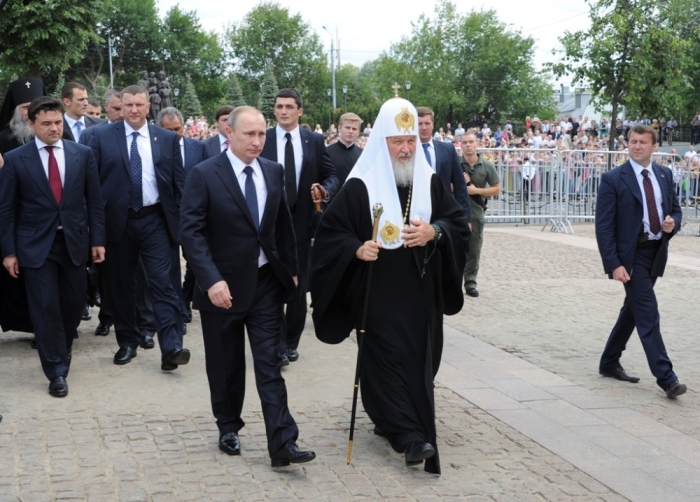World Council of Churches must suspend Russian Orthodox Church over Ukraine: foreign policy expert

A foreign policy expert has called on the World Council of Churches to remove the Russian Orthodox Church from membership over its support of the invasion of Ukraine.
Elisabeth Braw, an author and senior fellow at the American Enterprise Institute focused on national security issues, penned a column for the Center for European Policy Analysis on Tuesday titled "In the Name of God, Go."
Braw argued that the WCC, which she described as "the United Nations of global Christianity," should move to suspend the Russian Orthodox Church from its membership, citing Patriarch Kirill's support for the Russian invasion of Ukraine.
"As all Christians know and regularly profess, no Christian is perfect," wrote Braw. "But the Russian Orthodox Church is not only failing to live by the WCC's standard of living visible unity in one faith, working for mission and evangelism, serving human need, breaking down barriers between people, and seeking justice and peace: its leaders are actively showing their utter contempt for such Christian values."
Braw argued that "while Kirill may have to make compromises with the Kremlin in order to protect his church, his public support of the war has gone far, far beyond such basic cooperation."
"It is time that the WCC acknowledged this and suspended the Russian Orthodox Church's membership: it cannot harbor a war-mongering organization that mocks the WCC and global Christianity, even as the broader membership strives to live by the WCC's worthy goals," she continued.
"Being booted out by the United Nations of global Christianity is unlikely to sway the Russian Orthodox Church, any more than various diplomatic conventions have swayed the Kremlin. But it needs to be done, if only for the sake of simple, Christian decency."
Founded in 1948 as an ecumenical Christian body, the WCC has approximately 350 denominations as members, representing the interests of more than 500 million Christians worldwide.
WCC leadership has denounced the Russian war in Ukraine on multiple occasions, including a statement released in September calling the invasion "illegal and unjustifiable."
"As Christians from different parts of the world we renew the call for an immediate ceasefire to halt the death and destruction, and for dialogue and negotiations to secure a sustainable peace," continued the statement.
"In the meantime, we reiterate the central committee's appeal to our Christian brothers and sisters and to the leadership of the churches in Russia as well as in Ukraine, to raise their voices to oppose the continuing deaths, destruction, displacement and dispossession of the people of Ukraine."
In October, WCC Acting General Secretary Fr. Ioan Sauca led a delegation that met with Patriarch Kirill. The meeting lasted several hours and included a discussion on the invasion of Ukraine.
"We will continue to monitor and pray about the situation and continue the dialogue. We are operating through four foci: church relations, peacebuilding, statements, and communication," Sauca explained in October.
"I hope and pray that the fellowship of churches continues to and work towards just peace and towards the end of the war in Ukraine and the end of wars elsewhere in the world. I also pray that the WCC continues to be that open table which gathers Christians together and gives courage and patience to listen to one another even if we disagree."
Kirill's position on the war has also drawn the ire of other Orthodox churches and organizations. In March, an Orthodox Public Affairs Committee and a Ukrainian archbishop called for sanctions to be placed on the leaders of the Russian Orthodox Church. Last June, the United Kingdom announced sanctions against Kirill.
"Today we are targeting the enablers and perpetrators of Putin's war who have brought untold suffering to Ukraine, including the forced transfer and adoption of children," former Prime Minister Liz Truss said at the time.





























